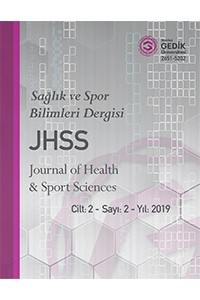Gıdalarda Sıklıkla Kullanılan Doğal ve Yapay Tatlandırıcıların Sağlık Üzerine Etkileri
Gıda endüstrisinde kullanılan iki tip tatlandırıcı mevcuttur bunlar bitki kaynaklı doğal tatlandırıcılar ve sentetik
tatlandırıcılardır. Doğal tatlandırıcı maddeler, sağlık üzerinde herhangi bir olumsuz etkiye sahip olmadıkları için sentetik
tatlandırıcı maddelere göre daha çok tercih edilir. Doğal tatlandırıcılar, diyabetik hastalar için yararlı maddelerdir. Bu
derleme gıda sektöründe en çok kullanılan doğal ve yapay tatlandırıcıların sağlık üzerine etkilerinin gözden geçirilmesini
amaçlamaktadır.
Anahtar Kelimeler:
aspartam, sakarin, doğal tatlandırıcılar, yapay tatlandırıcılar
___
- Hert, K.A., Fisk II, P.S., Rhee, Y.S., Brunt, A.R., Decreased consumption of sugarsweetened beverages improved selected biomarkers of chronic disease risk among US adults: 1999 to 2010. Nutr. Res. 34, 58e65, 2014.
- Priya, K., Gupta, V.R.M., Srikanth, K., Natural Sweeteners: A Complete Review, Journal of Pharmacy Research, 4(7),2034-2039, 2011.
- Carocho, M., Morales, P, Ferreira, I.C.F.R., Sweeteners as food additives in the XXI century: A review of what is known, and what is to come, Food and Chemical Toxicology 107, 302-317, 2017.
- Whitehouse, C.R., Boullata, J., McCauley, L.A., The Potential Toxicity of Artificial Sweeteners, AAOHN Journal, VOL. 56, NO.6, 2008.
- Sanyaolu, A., Marinkovic, A., Likaj J.G.L., Ayodele, O., Okorie, C., Verner, O., Artificial sweeteners and their association with Diyabetes: A review, Pub Health Catalog;1(4):1-3, 2018.
- Bostick, R.M., Potter, J.D., Kushi, L.H., Sellers, T.A., Steinmetz, K.A., McKenzie, D.R., Gapstur, S.M., Folsom, A.R., Sugar, meat, and fat intake, and nondietary risk factors for colon cancer incidence in Iowa women (United States). Cancer Causes Control 5, 38-52, 1994.
- Grundy, S.M., Hypertriglyceridemia, insulin resistance, and the metabolic syndrome. Am. J. Cardiol. 83, 25-29, 1999.
- Johnson, R.J., Segal, M.S., Sautin, Y., Nakagawa, T., Feig, D.I., Kang, D., Gersch, M.S., Benner, S., Scanchez-Lozada, L.G., Potential role of sugar (fructose) in the epidemic of hypertension, obesity and the metabolomic syndrome, diyabetes, kidney disease, and cardiovascular disease. Am. J. Clin. Nutr. 86, 899-906, 2007.
- Ludwig, D.S., Peterson, K.E., Gortmaker, S.L., Relation between consumption of sugar-sweetened drinks and childhood obesity: a prospective, observational analysis. Lancet 357, 505-508, 2001.
- Mente, A., Koning, L., Shannon, H.S., Anand, S.S., A systematic review of the evidence supporting a causal link between dietary factors and coronary heart disease. JAMA Int. Med. 169, 659-669, 2009.
- Slattery, M.L., Benson, J., Berry, T.D., Duncan, D., Edwards, S.L., Caan, B.J., Potterm, J.D., Dietary sugar and colon cancer. Cancer epidem. Biomarkers Preven 6, 677-685, 1997.
- Stanhope, K.L., Schwartz, J.M., Havel, P.J., Adverse metabolic effects of dietary fructose: results from the recent epidemiological, clinical and mechanistic studies. Curr. Opin. Lipidol. 24, 198- 206, 2013.
- Touger-Decker, R., van Loveren, C., Sugars and dental caries. Am. J. Clin. Nutr. 78, 881S-892S, 2003.
- Yang, Q., Zhang, Z., Gregg, E.W., Added sugar intake and cardiovascular diseases mortality among US adults. JAMA Intern. Med. 174, 516-524, 2014.
- Murray, S., Tulloch, A., Criscitelli, K., Avena, N.M., Recent studies of the effects of sugars on brain systems involved in energy balance and reward: relevance to low calorie sweeteners. Phys. Behav. 164 (part B), 504-508, 2016.
- Pepino, M.Y., Metabolic effects on non-nutritive sweeteners. Physiol. Behav. 152 (part B), 450-455, 2015.
- Ashok, I., Sheeladevi, R., Wankhar, D., Effect of longterm aspartame (artificial sweetener) on anxiety, locomotor activity and emotionality behaviour in Wistar albino rats. Biomed 4, 39-43, 2013.
- Fagherazzi, G., Vilier, A., Saes Sartorelli, D., Lajous, M., Balkau, B., Clavel-Chapelon, F., Consumption of artificially and sugar-sweetened beverages and incident type 2 diyabetes. Am. J. Clin. Nut 97, 517- 523, 2013.
- Amin, K.A, Al-muzafar, H.M., Abd Elsttar, A.H., Effect of sweetener and flavoring agent on oxidative indices, liver and kidney function levels in rats. Indian J Exp Biol. 54:56-63, 2016.
- Suez J, Korem T, Zeevi D, et al. Artificial sweeteners induce glucose intolerance by altering the gut microbiota. Obstet Gynecol Survey, 70: 31-32, 2015.
- Jain, T., Grover, K., Sweeteners in human nutrition. Int. J. Health Sci. Res. 5, 439-451, 2015.
- Masuda, T., Sweet-tasting Protein Thaumatin: Physical and Chemical Properties. Merillon, J.M., Ramawat, K.G. Sweeteners, Reference in Phytochemistry. Springer International Publishing, 2016.
- Nabors, L.O., Alternative Sweeteners. Marcel Dekker, Inc, New York, USA, 2001.
- Lobete, M.M., Baka, M., Noriega, E., Jooken, E., Monballiu, A., Beurme, S., Meesschaert, B., Impe, J.F.V., Stevia-based sweeteners a promising alternative to table sugar: the effect on Listeria monocytogenes and Salmonella typhimurium growth dynamics. Int. J. Food Microbiol. 245, 38- 52, 2017.
- El-Samragy, Y., Food Additive. Intech Publishing, Rijeka, Croatia, 2012.
- Spillane, W.J., Optimising Sweet Taste in Foods. Woodhead Publishing Limited, Cambridge, UK, 2006.
- ISSN: 2651-5202
- Yayın Aralığı: Yılda 3 Sayı
- Yayıncı: İstanbul Gedik Üniversitesi
Sayıdaki Diğer Makaleler
Futbol Antrenörlerinde Tutkunluk, Mükemmeliyetçilik ve Esenlik Arasındaki İlişkinin İncelenmesi
Murat MADAN, Cengiz KARAGÖZOĞLU
Mevlüt AĞIR, Mustafa Kamil ÖZER
Türkiye’de 6-12 Yaş Futbolunun (Grassroots) Geliştirme ve Sürdürülmesine Yönelik Model Önerisi
Gıdalarda Sıklıkla Kullanılan Doğal ve Yapay Tatlandırıcıların Sağlık Üzerine Etkileri
